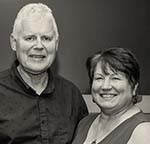by Denise Hodgman
RECENTLY I WAS SITTING AT THE KITCHEN TABLE of an Indigenous lady who had experienced much grief. She told me that she was just now starting to grieve for her daughter who had died about a decade ago. Her grieving had been delayed due the subsequent responsibility of raising her grandchildren. Then her son died, and she was again raising grandchildren and helping them to get through their own grief. Then a grandson died. She told me that she just wanted one year without a death, so that she could begin the process of grieving without yet another wave of grief crashing over her.
Death was never a part of God’s original plan. But it is part of our present reality. It wreaks havoc on relationships, and on the ability to navigate even the most mundane aspects of daily life. But God is so good that He can bring positives out of even the most negative of life’s experiences. What Satan means for evil, God works for good. Walking with people through their grief affords many opportunities to work with God to accomplish His good purposes. Here are a few of those opportunities that I’ve observed and experienced.
CHALLENGING WORLDVIEWS
A death gives opportunity to challenge false worldviews without directly correcting bad theology. When someone is hurting deeply from the loss of a loved one, it is not usually a time to correct faulty doctrine. But it is a time to help them analyze their own beliefs.
One friend, who I had been together with in many Bible studies and church services, told me that she was sure her daughter went to heaven because a sunbeam struck her coffin at the grave site. I did not say she was wrong, but I did affirm that Jesus is our way to heaven.
At a more recent funeral, my husband and I were asked to sing. To introduce the song, I talked about a memory of the young man who had passed, and remarked on how senseless it was that one so young should die. Knowing that many tribal peoples value spiritual power, I encouraged them that when death brings questions that we cannot answer, we should ask ourselves three questions: Do we need spiritual power? Where do we go to get this spiritual power? What is the cost of getting this spiritual power?
SHARING THE GOSPEL
A death often gives opportunity to communicate the Gospel. Even though many communities are rejecting Christianity as a system or an institution, in our area there is still an openness to the Gospel at wakes and funerals. Gospel songs can be sung congregationally, or as special numbers, or in the background as people walk past the casket. Scripture passages can be read. Biblical truths and words of comfort can be written in sympathy cards.
At the funeral where I talked about spiritual power, I told of how Jesus is where I get my spiritual power – because He is the most powerful in the universe. I also said that getting spiritual power from Him costs me nothing, because He paid it all when He died on the cross.
GROW IN RELATIONSHIP
Finally, a death gives opportunity for us to grow in relationship with the individuals, families and communities who have lost a person. Being present during the initial stages of grief helps build relationship, as we work alongside people. Sometimes it is easier for people to talk when we are both engaged in a task, such as setting up tables and chairs, or working on food preparation. One of the most intensely binding activities has been in taking our turn at shoveling dirt onto the lowered coffin.
Conversation, or just sitting together, happens in homes or hospital rooms when a person is dying. It also happens at wakes and at the meal after the funeral. Displays of affection also deepen relationships. Hugs and shaking hands are commonly exchanged.
Just before the funeral of one of my friends. I was standing by the open coffin crying in the nearly empty Band Hall when the brother of my friend, who I did not know, put his arm around me to comfort me. I thought I should be comforting him. Trying to pull myself together, I went to the ladies washroom to wash my face and dry my tears but ended up crying again. A community lady, who was also in the washroom, wrapped her arms around me and held me. Later my friend’s husband gifted me with her coat. Accepting comfort from community members also strengthens relationship.
Being present at wakes and funerals also strengthens relationship in that we are introduced to members of the extended family that we might not yet know. And, of course, grieving is really only beginning at these times. There are the months and even years afterwards when we can still talk with the grieving family about memories of the ones who have passed. We encourage them to turn to Jesus for the comfort, strength, peace and the wisdom they need to get through the grieving process.

 Rollie & Denise Hodgman serve in publications and urban outreach in Prince Albert, SK.
Rollie & Denise Hodgman serve in publications and urban outreach in Prince Albert, SK.
(from Northern Lights issue #566)

